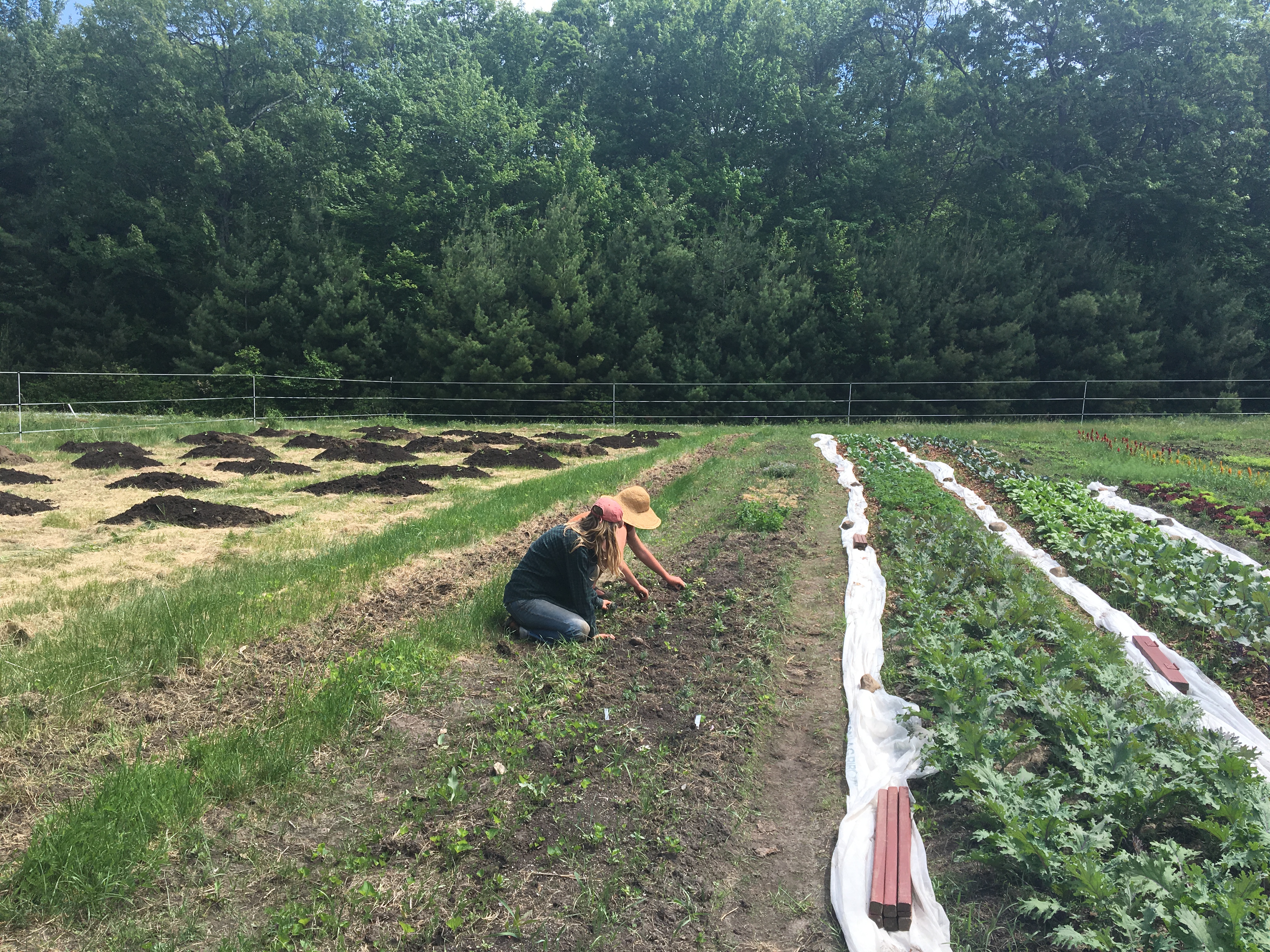Young farmers on the rise in Rhode Island
“This is Russian red kale, we have regular classic green curly kale that you’d see in the grocery store and those are …” says Courtney Sartini. Courtney, 23, is giving a tour of Hocus Pocus Farm, which she cofounded with Sophie Salaway. Hocus Pocus is a...
“This is Russian red kale, we have regular classic green curly kale that you’d see in the grocery store and those are …” says Courtney Sartini.
Courtney, 23, is giving a tour of Hocus Pocus Farm, which she cofounded with Sophie Salaway. Hocus Pocus is a two acre farm in Chepachet, Rhode Island that grows fruits, vegetables, flowers, and herbs that Rhode Islanders pick up weekly. Along with being a farm owner, Courtney is also attending the University of Rhode Island. Sophie, 25, already graduated from college. This is both of their primary jobs, and they tend to the farm 6 days a week from 7 am to 5 pm. Right now it’s just the two of them working on the farm, with the occasional help of volunteers.
Courtney and Sophie don’t fit into your typical farmer profile. According to the USDA’s Census of Agriculture data, over the past three decades principal operators, the farmers who make day to day decisions on the ground, have gotten older. The average age of farm operators in 2012 was 58 years old, about 10 years older than the average age of operators in 1982. There have always been less female principal farm operators, but that number has decreased since 2007. The census also found that the number of beginning farmers, or people who haven’t owned a farm for at least 10 years, declined.
Rhode Island is outside national farming trends. Unlike nationally, where the number of farms is declining, from 2002 to 2012, the number of farms in the state has increased by 50% according to the USDA’s Agriculture Census. In the past ten years, the number of farm operators under 34 years old nearly doubled.
Rhode Island is the ideal place for young farmers, say Courtney and Sophie:
“There’s a supportive atmosphere of other young farmers. There’s the young farmer network which is invaluable. They do events, they help us get to know other people and share information because most of us are not traditionally farmers, we don’t come from farming families, most of us are first generation farmers…We also definitely benefit from Providence being a food city. Johnson and Wales and many interesting chefs operating. Especially combined with the fact that the atmosphere here is very low cost of living.”
And Rhode Island high schoolers are getting involved in growing food locally too. Sinjon Goldberg and Abraham Bloom are rising seniors at Moses Brown High School in Providence. About a month ago, they started a small farm known as the Giving Garden. The Giving Garden was donated green space behind the office of TRAC Builders on Wolcott Street in Providence.
Sinjon and Abe teamed up with Gateways to Change, a nonprofit that helps adults with developmental disabilities engage in the community. In April, volunteers from Gateways to Change planted 60 vegetables, fruits, and other flowers at the Giving Garden. In six to eight weeks when the plants are ready to harvest, the Giving Garden is planning on donating all of their crops to the Rhode Island Food Bank.
Until then, Sinjon and Abe come every day to water and tend to the plants. But their Gateways to Change volunteers will be back soon. “They’re going to come on the cultivation day when we come and get all the yield. They’ll also be part of the process of donating it back to the food bank because really the main idea of this is to give them an opportunity to give back to the community ‘cause they’re normally on the receiving end. So really the most important day is give produce back to the food bank,” says Sinjon.
Sinjon and Abe are hoping to expand the Giving Garden, opening one location at the Moses Brown School and another at Squadlocker, a sports apparel company in Warwick.
Back at Hocus Pocus Farm, things are run very differently. While Sinjon and Abe were donated corporate green space, Sophie and Courtney had to start their farm from scratch. The two of them work daily to tend to their two acres, so that produce will be ready for shareholders starting in July. So far, 45 people have signed up to purchase their produce, and 15 of these shareholders will come volunteer on the farm. These shareholders will pick up their produce weekly from mid-July to October.
 Courtney and Sophie want to be sure their shareholders have access to clean, affordable fruits and vegetables, but as first time business-owners, they’ve come across a few bumps in the road. “As brand new business owners we’ve made several mistakes. We planted early just because we could, but now we’re having things that are ready, too old to wait to harvest for our first pickup and we don’t really have a way of selling them right now in place,” says Sophie.
Courtney is still a URI student, which hasn’t been easy while running her own farm.
Courtney and Sophie have lots of goals, beyond pulling weeds and tending to the same fruits and vegetables. Academically, Courtney still has to finish up at URI, and Sophie is hoping to go back to school to get her midwifery certificate. Back on the farm, they want to stay open during the winter, and maybe even start raising chickens. But right now, they’re taking it day by day.
“We’re always thinking what other great thing can we use this platform that we have to do something with? So we’re always kind of brainstorming. But i think this year we just need to float and grow vegetables and you know, continue to brainstorm,” says Courtney.
Courtney and Sophie want to be sure their shareholders have access to clean, affordable fruits and vegetables, but as first time business-owners, they’ve come across a few bumps in the road. “As brand new business owners we’ve made several mistakes. We planted early just because we could, but now we’re having things that are ready, too old to wait to harvest for our first pickup and we don’t really have a way of selling them right now in place,” says Sophie.
Courtney is still a URI student, which hasn’t been easy while running her own farm.
Courtney and Sophie have lots of goals, beyond pulling weeds and tending to the same fruits and vegetables. Academically, Courtney still has to finish up at URI, and Sophie is hoping to go back to school to get her midwifery certificate. Back on the farm, they want to stay open during the winter, and maybe even start raising chickens. But right now, they’re taking it day by day.
“We’re always thinking what other great thing can we use this platform that we have to do something with? So we’re always kind of brainstorming. But i think this year we just need to float and grow vegetables and you know, continue to brainstorm,” says Courtney.

Credit: Andie Corban. Courtney Sartini and Sophie Salaway tend to herbs at Hocus Pocus Farm.

